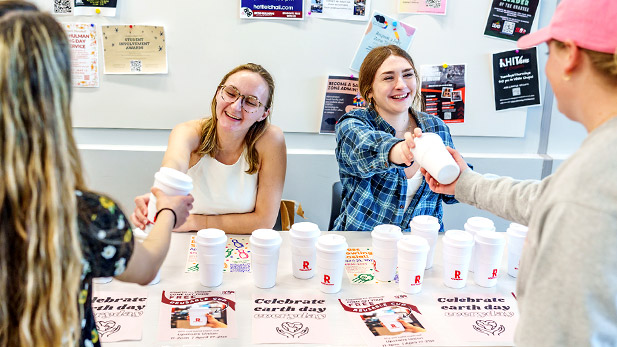Students Promoting a Sustainable Future Through Plastic Recycling Initiative

As part of campus’ Earth Week activities, the Student Government Association provided students a reusable cup to highlight a new plastic recycling effort supporting reTHink, Inc.’s community upcycling program.
Sustainable thinking for tomorrow is starting today with coffee cups, milk jugs and detergent containers being collected across campus in a new student-organized plastic recycling effort that’s striving to help an organization promote Terre Haute’s “Green” footprint.
The Student Government Association (SGA) started the initiative earlier this spring with students beginning to discard Type 2 (high-density polyethylene) and Type 5 (polypropylene) plastic waste at collection stations in residence halls and Mussallem student union. The project is being promoted with SGA providing students with a free reusable plastic cup as part of Rose-Hulman’s Earth Week celebration.
This initiative builds upon Rose-Hulman’s reputation as one of America’s top “Green” colleges, by The Princeton Review’s 2023 Guide to Green Colleges, for its strong commitment to the environment through sustainability campus policies, programs and practices.
“Earth Day should be every day at Rose-Hulman,” says SGA president Courtney Valmore. “Sustainability is important to students and this new plastic recycling program is another way for students to influence the future of our world.”
The new recycling effort is accepting such items as plastic coffee cups, milk jugs, pill bottles and caps, detergent and bleach containers, and a variety of food containers. (Most plastic items have a resin code on them; that’s the number inside the universal triangular arrow-shaped recycling symbol. If the number is a Type 2 or a Type 5, it is recyclable through this program. All donated items must be clean and label-free before being deposited into the campus’ collection bins.)
After being collected by Rose-Hulman’s residence hall and facilities staff, members of the campus’ Engineers for a Sustainable World (ESW) student organization will inspect, sort and prepare the plastic products to be donated to Terre Haute’s reTHink, Inc., a non-profit group of community citizens committed to promoting environmental sustainability within the community. The organization’s expanding Precious Plastic reTHink plastic upcycling program recycles Type 2 and Type 5 plastics to create a variety of products such as shelving, tables, benches, and clipboards – giving new life to materials expands the amount of post-consumer plastic waste that is recycled in the United States, which is reported to be at five percent.
"This program is a win-win-win,” said Associate Professor of Mechanical Engineering Rebecca Bercich, PhD, who serves as reTHink’s board president. “It diverts plastic waste from landfills and incinerators, provides educational and technical training opportunities to people in our community, and serves as a creative hub for artists, engineers, and entrepreneurs who want to make new, beautiful and useful products out of recycled plastic.”
The professor added, “Recycling is a labor-intensive process, though. We need help collecting usable plastic for the program so we can continue to do this good work for our community and the environment. I'm really encouraged to see Rose-Hulman students energized by the cause and volunteering their time to help reTHink increase its impact."
Rose-Hulman’s plastic recycling effort could be extended in the future to nearby Indiana State University, Saint Mary-of-the-Woods College, and Ivy Tech State College’s Terre Haute campus.
“The possibilities are endless, but we need to start with being successful on our own campus,” said Valmore, a junior who is striving to use her chemical engineering education to expand sustainable engineering initiatives. She has an upcoming summer internship in sustainable packaging with the Procter & Gamble Company.
“The future really starts with us (college students) being committed to our environment,” Valmore said. “This movement could start with a simple discarded plastic cup, then move to bigger objects that add to this important cause.”
This is the latest development highlighting sustainability at Rose-Hulman. A growing number of courses are introducing engineering and science students to implement design concepts with sustainable materials and little or no impact on the environment. An Introduction to Sustainability course is currently being taught by Professor of English Mark Minster, PhD, and had students traveling to Belgium and the Netherlands during the recent spring break to visit historic windmills and state-of-the-art wind farms, world-class solar farms, and greenhouses that cover the countryside of the two European countries. The students also met scientists, engineers, activists, and experts from climate and eco-power cooperatives and car-sharing initiatives.
Meanwhile, the Department of Chemistry and Biochemistry became Indiana’s first higher education institution to adopt a Green Chemistry Commitment that’s incorporating green chemistry theory and practice into classes, continuously improving green chemistry accessibility, and educating students that will develop a sustainable future.
Also on campus, ESW members maintain a community garden as part of their passion for environmentalism and drive to make the world, and campus, a more sustainable place. The New Academic Building became Indiana’s first building to earn full WELL Certification for design and technology that enhances the health, wellness and the human experience. And, for the last four years, Rose-Hulman has been recognized with the Tree Campus Higher Education designation by the Arbor Day Foundation for its continued commitment to effective urban forest management and engaging students, faculty and staff members in conservation goals. Nearly 250,000 trees spread throughout the institute’s 1,300-acre campus.